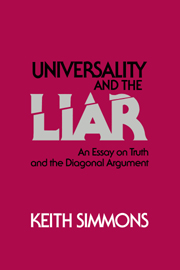Book contents
- Frontmatter
- Contents
- Preface
- Chapter 1 The Liar paradox
- Chapter 2 The diagonal argument
- Chapter 3 The diagonal argument and the Liar, I
- Chapter 4 The diagonal argument and the Liar, II
- Chapter 5 A medieval solution to the Liar
- Chapter 6 A singularity solution to the Liar
- Chapter 7 A formal account of singularities
- Chapter 8 Applications and further singularities
- Chapter 9 Semantic universality
- Notes
- Bibliography
- Index
- Frontmatter
- Contents
- Preface
- Chapter 1 The Liar paradox
- Chapter 2 The diagonal argument
- Chapter 3 The diagonal argument and the Liar, I
- Chapter 4 The diagonal argument and the Liar, II
- Chapter 5 A medieval solution to the Liar
- Chapter 6 A singularity solution to the Liar
- Chapter 7 A formal account of singularities
- Chapter 8 Applications and further singularities
- Chapter 9 Semantic universality
- Notes
- Bibliography
- Index
Summary
Many ways out of the Liar have been proposed over the past twenty-four centuries. But the Liar is more than a fascinating puzzle of long standing. The paradox turns on our most fundamental semantic concepts, most notably that of truth. By investigating the Liar, we can hope to deepen our understanding of the concept of truth and related semantic notions.
This book is about the Liar. It is also about the problem of universality. The problem is this: is a natural language like English universal in the sense that it can say everything there is to say? Or are there concepts beyond the reach of English, rendering it expressively incomplete? In particular, we can ask whether English is semantically universal; whether, that is, it can express every semantic concept. Ever since Tarski, the Liar and the problem of semantic universality have been linked. In my view, they are at root the same.
There is another closely related theme that runs through the book: the method of diagonalization. The diagonal argument is a method of argument that establishes some fundamental theorems of mathematical logic. Yet the diagonal argument also generates certain paradoxes. For example, in 1936 Tarski used the method of diagonalization to prove that classical formal languages are not semantically universal: no such language can express its own concept of truth. And yet it is also a diagonal argument that generates versions of the Liar paradox. Diagonalization is at the heart of the Liar and the problem of universality.
- Type
- Chapter
- Information
- Universality and the LiarAn Essay on Truth and the Diagonal Argument, pp. ix - xiiPublisher: Cambridge University PressPrint publication year: 1993



